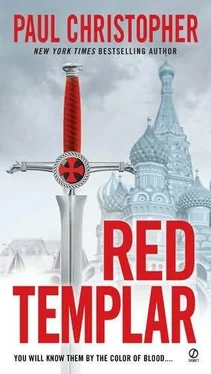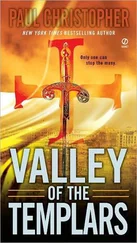Paul Christopher - Red Templar
Здесь есть возможность читать онлайн «Paul Christopher - Red Templar» весь текст электронной книги совершенно бесплатно (целиком полную версию без сокращений). В некоторых случаях можно слушать аудио, скачать через торрент в формате fb2 и присутствует краткое содержание. Жанр: Политический детектив, на английском языке. Описание произведения, (предисловие) а так же отзывы посетителей доступны на портале библиотеки ЛибКат.
- Название:Red Templar
- Автор:
- Жанр:
- Год:неизвестен
- ISBN:нет данных
- Рейтинг книги:3 / 5. Голосов: 1
-
Избранное:Добавить в избранное
- Отзывы:
-
Ваша оценка:
- 60
- 1
- 2
- 3
- 4
- 5
Red Templar: краткое содержание, описание и аннотация
Предлагаем к чтению аннотацию, описание, краткое содержание или предисловие (зависит от того, что написал сам автор книги «Red Templar»). Если вы не нашли необходимую информацию о книге — напишите в комментариях, мы постараемся отыскать её.
Red Templar — читать онлайн бесплатно полную книгу (весь текст) целиком
Ниже представлен текст книги, разбитый по страницам. Система сохранения места последней прочитанной страницы, позволяет с удобством читать онлайн бесплатно книгу «Red Templar», без необходимости каждый раз заново искать на чём Вы остановились. Поставьте закладку, и сможете в любой момент перейти на страницу, на которой закончили чтение.
Интервал:
Закладка:
“Go on,” Holliday said.
“On the twenty-second of June 1941, the Third Reich declared war on the Soviet Union. The following day preparations for the evacuation of the Hermitage began. By the first of July, less than two weeks later, two heavily armed and guarded trains took over one-point-five million objects from the Hermitage to safety. By the twentieth of July almost everything had been removed. Stalin, ever the pragmatist, decided that the Kremlin treasures should be crated up and removed as well, the Kremlin Egg among them. They remained hidden away until October of 1945, when the treasures were returned to the Hermitage and to the Kremlin Armoury. That is the time I think the real Uspenski Cathedral Egg was switched with the forgery-while they were in hiding.”
“Where were they hidden?” Holliday asked.
“The town of Sverdlovsk, which is ironic, really.”
“How so?”
“You may know of Sverdlovsk under its original name,” said the Russian. “And the name it is known by today-Yekaterinburg.”
“Where the Romanovs were murdered,” said Holliday. He’d read a spy novel about it once. The book had an odd title. Then he remembered. “The House of Special Purpose.” He nodded.
“Quite so,” said Genrikhovich. “Comrade Lenin’s euphemism for the Ipatiev House. The czar and his entire family were shot in the basement there in the early-morning hours of July 17, 1918. Which is doubly ironic.”
“Why?” Holliday asked.
“There were three places in Sverdlovsk where the Hermitage and Kremlin treasures were stored-an art gallery, a Catholic church and the Ipatiev House, which by then had been made into an antireligion museum.”
“The Kremlin Egg had been stored there?”
“I checked the inventory ledgers-the crate with the egg was listed as being warehoused there for the duration.”
“What are the odds of there being anyone there who’d know anything?”
“Quite good, actually.” The Russian smiled. “The House of Special Purpose was demolished in 1977 by order of Boris Yeltsin, but in late 1999 an Orthodox church was built on the site, the Church on Blood in Honour of All Saints Resplendent in the Russian Land. There is a museum to the Romanovs there-its director is the son of the staff member from the Hermitage who was in charge of the Ipatiev House inventory during the war.”
“So we go to Yekaterinburg?”
“That would be my suggestion.” Genrikhovich nodded.
“How do we get there? The FSB will be watching the train stations and the airport.”
“We drive to Tosno; it is about fifty kilometers from here. They will not be watching the train station there. It is the first stop on the St. Petersburg-Moscow line.”
“I thought the highway police had roadblocks every few miles.”
“That was in the old days. They’re lucky to have the manpower for a roadblock every hundred kilometers now, if that. And I know how to deal with the highway police. By necessity they are little more than uniformed thieves. A handful of rubles will be our passports as long as we keep your Cuban friend hidden in the back of the van. He is too much of a curiosity, I am afraid.”
“When can we leave?”
“Early tomorrow morning. The Red Arrow leaves St. Petersburg every day at one in the afternoon. It stops in Tosno twenty-five minutes later. We must be there to meet it.”
“Red Arrow?” Eddie asked.
“A very famous train,” said Genrikhovich, smiling. “Its nickname is Letayushchii Bordel. ”
The Cuban laughed. “The Flying Brothel?”
19
Brinsley Whitman Havers, at thirty-eight, was the youngest assistant to the assistant national security adviser in the history of the White House. It was an accomplishment of which he was immensely proud, especially since he had been born Paramahansa Kumar Aggarwal in May Pen, Clarendon Parish, Jamaica, bastard stepson to Rambhan Kundgolkar Aggarwal, a wholesale dealer of Trout Hall oranges.
His mother, Aishwarya Vrinda Aggarwal, had been only seventeen when she married the much older Rambhan Kundgolkar, who, in the final analysis, was unable to consummate the marriage, let alone impregnate his young bride. It was hardly surprising then that Aishwarya Vrinda separated from her family in Mangalore by ten thousand miles and, consequently lonely, would look elsewhere for love. Even less surprising that she would find it in the figure of a well-known “randy man” about town named Nedrick Samuels, whose friendship was mistrusted by most husbands and resisted by few wives.
Paramahansa Kumar was the result of the illicit liaison, a responsibility unacknowledged by young Nedrick, who discreetly removed himself to St. Ann Parish as soon as Aishwarya Vrinda began to show evidence of her infidelity. In the old days back in Mangalore, Aishwarya Vrinda would almost certainly been whipped, either by her husband or by her own father, but considering his own inabilities, Rambhan Kundgolkar decided to accept the child as his own, despite the fact that the boy was several shades darker than anyone in the Aggarwal family had ever been.
On the death of her husband when Aishwarya Vrinda was twenty-eight, she liquidated all of the older Aggarwal’s assets and moved to East 28th Street in New York City, where she opened an Indian grocery called Aggarwal’s. Five years later both she and her son were bona fide American citizens. Their red-and-gold Jamaican passports were ceremoniously burned in the trash barrel behind that first store. Soon, Aggarwal’s resided all over the state.
At the age of eighteen, before enrolling in Harvard Law School and with his mother’s permission, Paramahansa Kumar Aggarwal legally changed his name to Brinsley Whitman Havers and left his past, and what was left of his Jamaican accent, behind. He casually let his fellow students know that he was actually Brinsley Whitman Havers III, cultivated the nickname “Whit” and never looked back.
And here he was, summa cum laude from Harvard, a thirty-eight-year-old boy wonder in the White House coming down from the second floor of the West Wing for a meeting with his boss and the national security adviser himself.
Whit Havers reached the bottom of the stairs, turned to his left and knocked on the door of the national security adviser’s office.
“Enter,” came the gravelly voice of General George Armstrong Temple, the NSA himself. Whit did as he was told and stepped into the office. There were tall windows on two sides, to the north looking down the main drive from the Pennsylvania Avenue entrance, and to the west overlooking West Executive Avenue, now closed to public traffic. Like most of the windows in the White House, the panes in the national security adviser’s office were bulletproof.
The general had no desk. Instead, he worked at a long conference table set with twelve armchairs. The general was in his shirtsleeves, which were rolled up to his elbows. His trousers were held up with braided leather suspenders. Bright red half-lens reading glasses sat on the end of his blown-out drinker’s nose.
He was at least a hundred pounds overweight, smoked cigars constantly and wheezed when he talked. There was a pool on the second floor based on how many months into the term he’d last before keeling over. Whit hadn’t entered the pool; the general was like Dick Cheney-his heart was made of concrete and his liver was made of cheese, but he’d probably outlive all of them. People as mean and hard as that never died; death was too scared to come within a mile of them.
The only other person in the room was J. Hunter Kokum, Whit’s boss, the assistant NSA. Kokum was in his sixties, pale as a ghost and thin as a scarecrow. In his spare time he raised Thoroughbreds in Kentucky. His last job had been as assistant director of plans at the CIA. Before that he was deputy director of the FBI.
Читать дальшеИнтервал:
Закладка:
Похожие книги на «Red Templar»
Представляем Вашему вниманию похожие книги на «Red Templar» списком для выбора. Мы отобрали схожую по названию и смыслу литературу в надежде предоставить читателям больше вариантов отыскать новые, интересные, ещё непрочитанные произведения.
Обсуждение, отзывы о книге «Red Templar» и просто собственные мнения читателей. Оставьте ваши комментарии, напишите, что Вы думаете о произведении, его смысле или главных героях. Укажите что конкретно понравилось, а что нет, и почему Вы так считаете.











